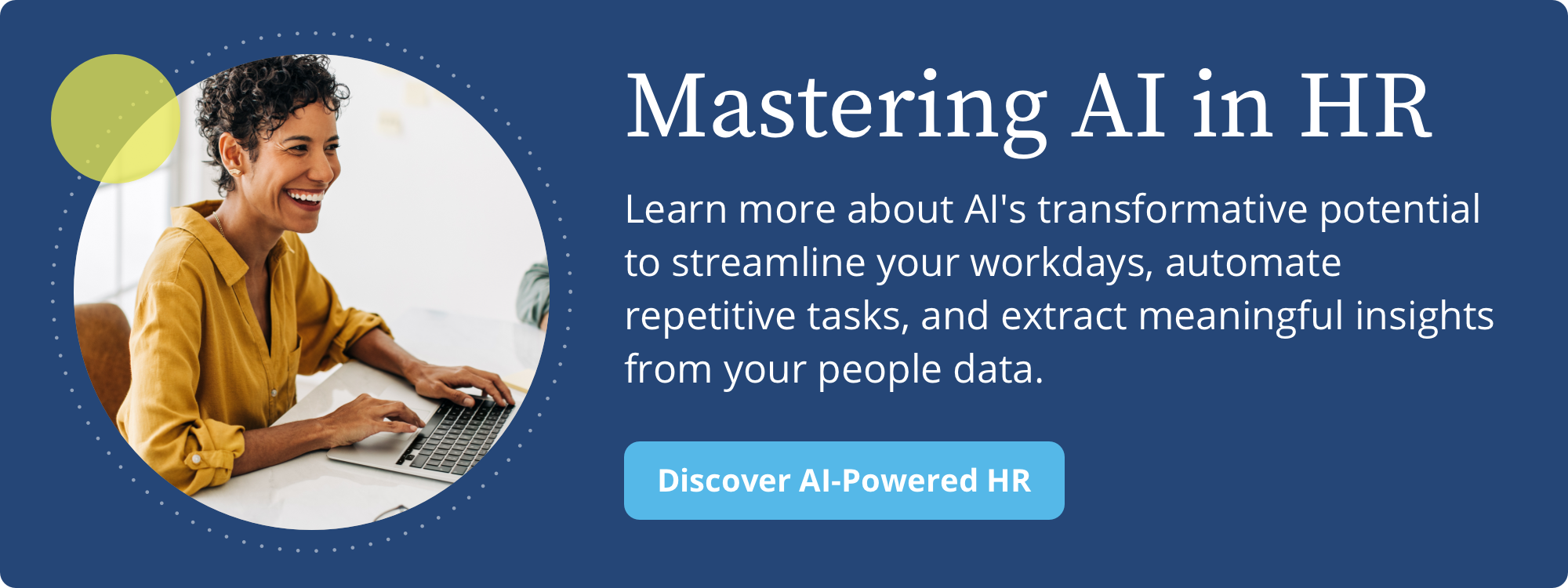Over the past several years, we’ve watched the evolution of HR take place at breakneck speed — and it’s not slowing down anytime soon. Enter artificial intelligence in HR.
One in four organizations says it already uses AI or HR automation. 85% of employers using AI and automation say it’s saving them time. Even if your team doesn’t use HR AI tools officially, more than likely, they’re using them unofficially — ChatGPT had one million users within five days of its November 2022 release.
But AI isn’t fail-proof technology, so an effective human resources management strategy needs to include guidelines for how to use it responsibly. It’s important to understand what HR AI tools can do, where they're limited, and the risks of using them.
Follow these HR AI best practices to successfully implement new technology and strategies and reap the benefits of this high-powered tool.
85% of employers using #ArtificialIntelligence say it’s saving them time. Learn 5 #bestpractices for #AIinHR.Understanding the Power of AI in HR
It may seem like the digital HR revolution only recently kicked into high gear when workers went remote en masse in early 2020. Now, just a few short years later, we’re enlisting AI HR software and machine learning (ML) to enhance our digital HR strategies.
Generative AI and, in some cases, advanced ML models, are helping HR teams work more efficiently, learn from their people data, and make strategic decisions. 56% of HR employees using AI say it saves them one to three hours per day, which quickly adds up to days of time saved.
HR AI-powered strategies can be used across all the major HR functions. Here are a few examples of how:
- Talent acquisition: Speed up candidate communication — and the entire recruiting process — by using AI to generate a variety of emails and texts in seconds.
- Onboarding: AI helps HR create personalized onboarding plans that engage new employees from the moment they’re hired and guide them through the steps of the onboarding process.
- Performance management: AI reveals top performers and those who are struggling, plus helps HR identify high-potential talent and employees at risk of underperforming.
- Employee development: AI helps HR design career paths and training programs that are tailored to the specific needs of the employee and the company.
- Employee engagement: AI-driven sentiment analysis and feedback systems allow HR teams to better understand the employee experience, leading to more effective engagement strategies.
5 Implementation Best Practices for AI in HR
Using new technology is rarely as simple as turning it on and diving in, especially when the tech is as new as AI. You want to be sure you’re using it strategically and encourage employee adoption through education. And you want to keep an eye on its impact to ensure it’s having the impact you hoped for.
That’s why any time you introduce new AI HR software at work, it should be accompanied by a detailed implementation plan. Plans make it far more likely your implementation will succeed by establishing:
- An understanding of the problems the new technology is expected to solve
- The risks involved in adopting new technologies
- A real example of the technology’s success
- The importance of data accuracy and security
- A training schedule to educate employees on how to use the new technology
- A cadence for evaluating the efficacy of the new technology
Let’s take a look at five best practices for bringing AI into your HR processes.
1. Define Your Goals for HR AI Tools
Setting clear goals is vital for successful AI implementation in HR. Your team should define specific challenges they want to address or improvements they want to make, as well as other plans for AI.
For example, say you want to increase employee retention after the first six months. You might set a goal to use an AI-powered chatbot to engage with candidates during the hiring process, improving the candidate experience, which is proven to increase retention. You can use this goal to measure whether or not your AI endeavor is a success.
How Do Employees Feel About AI in HR?
Employees are skeptical about the use of AI in a few areas of HR:
- 54% say it’s unethical to use AI to make HR decisions
- 35% say they’re doubtful about AI’s ability to evaluate performance
- 48% want a human to be involved in making decisions about layoffs
Maintain trust by adhering to ethical AI use standards, being transparent about how you’re using it, and asking employees how they feel about AI.
2. Know the Risks of Using AI in HR
With the significant benefits of AI also come some risks to be aware of, including data privacy and security, bias, and compliance.
Using AI with sensitive employee information means it’s critical to adhere to data privacy regulations and ethical considerations to protect employees' rights and maintain trust. HR departments must ensure that AI HR software complies with data protection laws and that employee data is safeguarded throughout the implementation process.
Though it has uses as an anti-bias tool, AI can sometimes increase the risk of discrimination. Be sure you’re aware of instances where AI was shown to disqualify qualified candidates or discriminate against female candidates.
Laws governing how companies use AI are also popping up — New York City recently limited how companies can use AI during the hiring process. That means your team needs to be diligent about compliance if you bring AI into your workflows.
Did you know that New York limits the use of #ArtificialIntelligence in the #hiringprocess? That’s why understanding risks and compliance around #AIinHR is 1 of 5 best practices.3. Ensure Data Quality When Using AI HR Software
AI algorithms depend on accurate and relevant data. Inaccurate or outdated data can lead to flawed conclusions and ineffective AI outcomes. Your HR team plays a crucial role in feeding HR AI tools accurate, current data. You’re like the data guardians, making sure the information is correct and reliable.
Collaborate with data experts and AI developers to ensure data accuracy and relevance. Perform regular data audits, cleansing, and validation to maintain data integrity and prevent biases in AI-driven insights.
AI is only as good as the data it's fed. You don’t want bad data, confusion, or bias clouding the AI's insights. By keeping the data in top-notch condition, HR sets the stage for AI to perform at its best and deliver truly valuable insights that you can trust.
4. Train Your Team to Use AI in HR
Implementing AI in HR requires a workforce that is well-versed in AI capabilities and limitations, which necessitates training. Provide comprehensive training to your HR team that covers AI fundamentals, its potential applications in HR, and ethical considerations surrounding using AI in HR.
You should also train your employees that AI is meant to augment human decision-making, not replace it. It’s essential to maintain oversight and intervene where necessary to ensure ethical and unbiased outcomes. It’s also vital to stay on top of the laws and regulations around AI in HR so you can properly train your employees and remain compliant.
Using AI responsibly is still a new, evolving concept, and that’s something you should be transparent about. Regularly evaluate your AI tools to help identify potential biases and ensure AI aligns with organizational values.
“AI has the potential to transform jobs across every industry and specialty. Employers must anticipate these kinds of seismic technological shifts and provide resources and training to ensure the success of their employees, customers, and ultimately their business.” - Brent Hyder, president and chief people officer of Salesforce via HR Dive
5. Monitor and Evaluate HR AI Systems
AI implementation is an iterative process; as we’ve mentioned, assessing your system ensures it’s performing as expected. If it is, you can prove the ROI of the software and make the case for further investment. If not, you can address the issue, whether that’s a different approach to using the AI tool or looking for a new solution.
Regular updates and enhancements to HR AI tools ensure they stay relevant and continue to meet your HR team’s objectives.
The Future of HR with AI
The future of AI in HR is already here, and with its rapid progress, you should expect to see even more sophisticated tools revolutionizing HR practices and enabling greater automation and insights. AI will continue to enable strategic HR management, empowering HR teams to make more informed decisions, create personalized experiences, and focus on strategic initiatives that foster employee growth and well-being.
Artificial intelligence offers tremendous potential for optimizing processes and elevating HR strategies. But AI won’t take the “human” out of “human resources” if you stay informed on the best ways to use it.
By understanding the capabilities of AI HR software, setting clear goals, ensuring data quality, providing adequate training, and continuously monitoring AI systems, HR professionals can harness the power of AI responsibly and deliver even more impactful outcomes for their organizations and employees.
Stay ahead in the HR industry by integrating AI and automation thoughtfully. Discover the transformative power of technology — explore ClearCompany HR automation and AI solutions.



